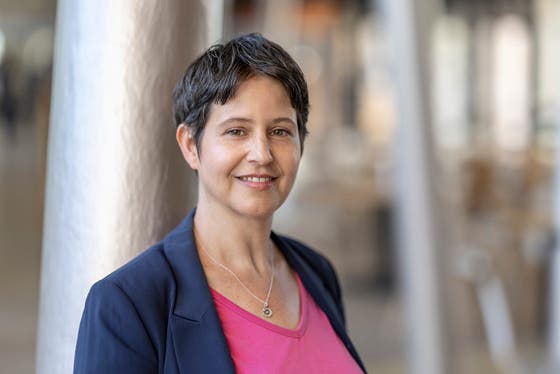Van Wijk: 'Science is due for a Great Reset'

Young scientists are increasingly opting for careers in industry and are increasingly abandoning scientific research institutions. This is because funding bodies and employers are steering on the wrong indicators, and this has to change, UMC Utrecht immunology professor of tissues Femke van Wijk argued in her oration on Wednesday 12 October. She called on colleagues to remain aware of the goals and values that bind scientific researchers together.
In her oration, Femke van Wijk - who has also been Manager Research Division Children since 1 September 2022 - came up with concrete examples. Van Wijk: "There is a system rigged by subsidy and employers that revolves around rules and performance indicators. Time sheets, interim reports, mandatory meetings, percentage of open access publications, and auditor's reports. In my view, it is a fallacy to think that steering by such rules leads to scientific breakthroughs. In the near future, it leads to researchers getting bogged down and causes talented researchers to choose positions elsewhere." She stresses that this phenomenon is already the reality in America. "Many scientists are already looking for and finding a more attractive alternative there, for example a position in industry."
Warning
In her oration, Femke van Wijk draws the parallel between resetting the immune system in chronic inflammatory diseases and resetting science. "The immune system is a well-organised network of, among others, different T cells with specific tasks, aiming to protect the body from unwanted invaders. T cells depend on communication via secreted signalling substances and mutual contact. Scientists are also a well-organised network, which benefits from communicating optimally and sharing new insights.
But both the immune system and science show flaws. When Femke compares the behaviour of many scientific researchers with the behaviour of an animal species, she ends up with the ants. "For the colony to function, ants depend on communication through secreted signalling substances and mutual contact. This enables them to function as one large organism. But when something goes thoroughly wrong, a group of ants can end up in what is known as a death spiral.
Femke's picture of this 'death spiral' is ominous: "Due to an external trigger that disrupts pheromone communication, the ants then follow each other in a circle that is very difficult to break. And ants keep adding to it. Eventually, these ants die of exhaustion." According to Femke van Wijk, there is a risk in this: "Researchers follow a trail of grants, papers and credits and obediently circle the system. Until the system becomes exhausted. A tragic risk of a carefully self-organising system."
Different course
"I realise that a call for change is met with resistance. The fear of losing assets or achievements is entirely justified. However, as scientists, we are connected by our curiosity, as well as the contribution we want to make to science and society. Values that belong to this are creativity, freedom, transparency, and synergy. Does the current system match these?" According to Femke van Wijk, researchers are now losing freedom and creativity because of performance pressure and steering on the wrong indicators. "And because we are judged as individual scientists, we mainly try to distinguish ourselves from other scientists."
Solutions
To arrive at a solution, Femke van Wijk again likes to take an example from the behaviour of ants. "Ant colonies function as one organism and defend their colony. But this does not mean that they see all other colonies as competitors. No, they form super colonies where many colonies below ground are connected and work together," she says. "It takes precision, courage and synergy to do what ants do so successfully. Let's really think hard about how to take the flaws out of our system, let's really take steps to start steering on other indicators and, above all, let's start working together more, with our own scientific goals and values at the forefront, so that we strengthen each other above all in the years to come."
